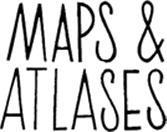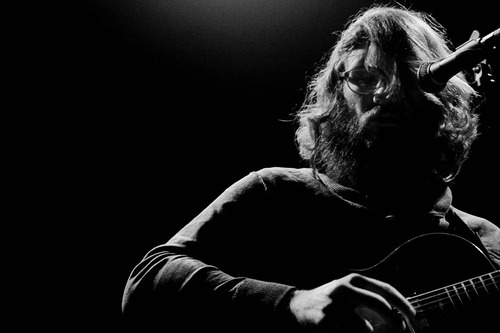Interview with The AV Club

Dave Davison and Erin Elders
The band members discuss their biggest influences
Maps & Atlases formed in 2004 at Columbia College, and soon gained notoriety for their frenetic musicality, impressionistic lyrics, and lead singer Dave Davison’s unique vocals. The band’s experimental math rock-influenced sound gave way to a less abrasive folk approach on its debut full-length, Perch Patchwork, released last year on Barsuk Records. While the band may have scaled back its overt musical flair over time, it remains one of the tightest, most interesting musical acts going.
The A.V. Club caught up with Davison and Erin Elders, (guitarist-lead singer and lead guitarist, respectively) in advance of their set at A.V. Fest this weekend, to talk about some of their favorite local bands, as well as their experiences as musicians and music fans in Chicago.
The Flying Luttenbachers
Dave Davison: When we first started, early on in our academic careers at Columbia, we were finding out about so much stuff at once. Other than bands like Smoking Popes and other groups I would hear about on, like, Q101, I didn’t really know much about underground bands in Chicago.
I soon found about the whole Drag City/Thrill Jockey/Touch And Go scene, but it seemed so unattainable and unrelated to the kind of shows that we were playing. Even though we enjoyed the music, it seemed like a different thing. We were all 20, 21 [years old]; all the shows we played were with hardcore bands at American Legions.
Erin Elders: When I moved here, I was definitely aware of some of the bigger Chicago punk bands, like Alkaline Trio and The Lawrence Arms. I came here to study film, so [not] necessarily in music mode, but all of a sudden, it was like, “Oh my god, who are The Flying Luttenbachers?”
DD: Early on, we were exposed to a lot of different things in Chicago, and began looking to bands like The Flying Luttenbachers, Sweep The Leg Johnny, and 90 Day Men. I remember picking up a copy of the [Chicago] Reader, and 90 Day Men were on the cover of the music section, and reading about them was amazing. There were a lot of bands right at that time that were a part of that unattainable world.
The A.V. Club: Sure, plenty of young bands struggle to understand how to go from playing warehouses and basements to playing shows at larger venues like Metro.
DD: Yeah, there were a lot of shows that we saw that were really cool and interesting. These shows were fun, most of the bands we played with don’t exist anymore. There’s something fun, looking back on it, to romanticize that time. These shows where you see a band that’s really fun and crazy, and it’s pretty unlikely that you’ll ever see them again.
Karma With A K
DD: The one band that we played with a lot, that we still listen to, this band called Karma With A K. (Whose two key members went onto become Gypsyblood) They broke up in 2007, but they were absolutely wild. We started playing nearly every show together for a couple years. They had a Les Savy Fav-meets-MC5 thing, so every show we had with them, there was a story that came out of it. They’d use the space during their set in a really scary, exciting way. I still listen to the handful of demos they recorded that Shiraz [Dada, Maps & Atlases’ bassist] produced.
AVC: Was there a band that you played with, be it a bigger local group or a national touring act, that helped you transition from that art space scene into larger venues?
Russian Circles
DD: I feel like the one that we always thought of as our first big show was at The Texas Ballroom. We played with Russian Circles and The New Black. That was the first time anybody had written anything about us. There wasn’t, like, a bunch of press or anything, but just any acknowledgement was crazy.
Travis Morrison
EE: Somebody acknowledged us as a band. Some people watched us play. It was crazy; people were going pay attention. The other big “real” show we played early on, where we got to open for somebody, was with Travis Morrison at the Bottom Lounge. Being really big Dismemberment Plan fans, we were all really excited to play. But no one came to the show!
AVC: That probably had something to do with that famous 0.0 Pitchfork review…
EE: Yeah, it probably did.
Drag City Records
AVC: You guys have mentioned Smog and a few other Drag City groups in interviews before. Is it safe to assume you guys are pretty big fans?
DD: Drag City is a label that we have all followed for nearly as long as we have loved music. We were exposed to Bill Callahan [singer-songwriter formerly known as Smog] through exploring Drag City. We played a show at a college festival really early in the day; he played way later. Seeing him play was an amazing experience.
I’ve seen him a bunch of times since then. I saw him at the Second City Marathon last year. He only played, like, three songs; it was the middle of the day. He was sitting five feet away, with just a guitar and a mic, and there were like 10 people in the room. It was amazing.
EE: Drag City, Thrill Jockey, and Touch And Go have always been put out records we’ve obsessed over. Bands that have shaped us, but we haven’t played with … we haven’t played with any Thrill Jockey bands.
AVC: There seems to be a distance there between you as fans and you as musicians.
DD: I’d say so. I think that’s maintained from when we first started. I think we’ve remained fans of those labels and the music they put out.
Braid
AVC: Braid just played the Metro not too long ago. Maps & Atlases is sometimes grouped in with other ’90s throwback bands, many of which owe a lot to bands like Braid. Do you feel any sort of kinship there?
DD: That comparison’s made a lot, especially on our first recordings. I had never heard Braid before we had already recorded our first release. People would say, “Oh, it sounds like Braid,” and I finally listened to them, and was shocked. It was uncanny how similar my voice on those early demos sounded to Bob Nanna’s. They’re a great band. I’m glad that I’ve been able to listen to them more.
Make Believe
EE: The Chicago scene was very art space-centric when we started. I remember we went to this Halloween show at some space that existed for like, a month. Make Believe played, and the crowd was wild; it was the total antithesis of what we’d been used to.
DD: Make Believe was a fantastic band. Every time I hear one of their records, there’s a real lasting quality. You want more people to hear them. They’re different and really interesting to listen to. They take it so far out there, but in a way that’s fun. It’s easy to make music that is really out-there and weird, but it’s hard to keep it fun and natural, so that you can play it anywhere and people will get excited.
EE: That band was also really punk rock in a really interesting way. They’d have really crazy guitar parts and bass lines that you can dissect, but you could also back up and just nod your head to this cool rock song.
The Kinsellas consistently make really great music. It’s always great to run into them and talk about music; we’ve sort of become artistic peers. They’re always out there doing stuff that’s really exciting.
DD: When we tour other countries, people are really excited to bring up Joan Of Arc and Make Believe when talking about Chicago. We met a guy in the U.K. who was a huge fan of Joan Of Arc. He slept in this giant Joan Of Arc T-shirt every day for years and couldn’t believe we’d ever met any of those guys in any way.
AVC: So you got to see the inaccessibility from the other side with that. Where you go from having no idea how to access these bigger scenes, to meeting a Kinsella superfan a few years later and saying, “Oh yeah, I know those guys.”
DD: Exactly.
AVC: Are there any local groups starting up that you’ve been into lately?
DD: Gypsyblood is a new band featuring members of Karma With A K, and they’re great. The other band with a few members of Karma With A K is a band called Thin Hymns. They’re both definitely worth checking out.
I feel like there’s been a wave of new, cool bands in Chicago lately. Speaking of the Kinsellas, I think Nate Kinsella, who plays under the name Birthmark, is working on a new record.
EE: Birthmark is so good! We played in Grand Rapids, [Michigan] a couple weeks ago with this band called Brontosaurus. They’re a two-piece from Chicago. That band Heavy Times is pretty great, too. I’ve seen them a couple of times.


